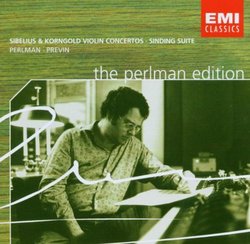Amazon.comOn this disc, the playing's the thing and it is fabulous. Originally made in 1979 and 1980, these recordings capture Perlman at his incomparable peak. The effortless perfection of his technique leaves you gasping in disbelief; even the infamously unplayable passages in the Sibelius Finale are tossed off with easy nonchalance, and he avoids the false accents often heard in the treacherous opening theme. And Perlman's toneis warm, mellow, pure, and constantly expressive; its golden glow is like burnished copper on the low strings, like radiant sunshine up high, and he can vary it instantaneously with bow and vibrato to fit the music. Of the three works, the Sibelius is, of course, the best and most familiar; underplaying its extroverted flamboyance without sacrificing its virtuosity, Perlman brings to it an unusual degree of inwardness. Another striking feature of the performance is the clarity of the orchestral texture, which allows generally unnoticed lines and details to come out. The Sinding Suite begins with a marathon run-around, goes into a sentimental ballad up the G string, and ends with what sounds like a parody of a baroque dance. Of all the European emigré composers who found refuge in Hollywood, Korngold was probably the most talented and best known. His film scores deservedly brought him fame and fortune but little artistic satisfaction; he continually attempted, to write "serious" music but found his old style passé and the new styles incomprehensible. Perhaps this disappointment eroded his inspiration; all his American concert compositions fall back on material from his film music. The violin concerto, premiered by Heifetz, who championed several European Hollywood composers, is ingratiating and somewhat derivative. The melodies swoop and soar, the form is episodic, the orchestration colorful, the style overripe, sentimental, atmospheric and evocative: one can easily imagine a film around it. The solo part is ferociously difficult but very effective, exploiting every resource of the instrument; Perlman plays it with incredible virtuosity, a glorious sound, and completely serious, honest expressiveness. --Edith Eisler


 Track Listings (9) - Disc #1
Track Listings (9) - Disc #1